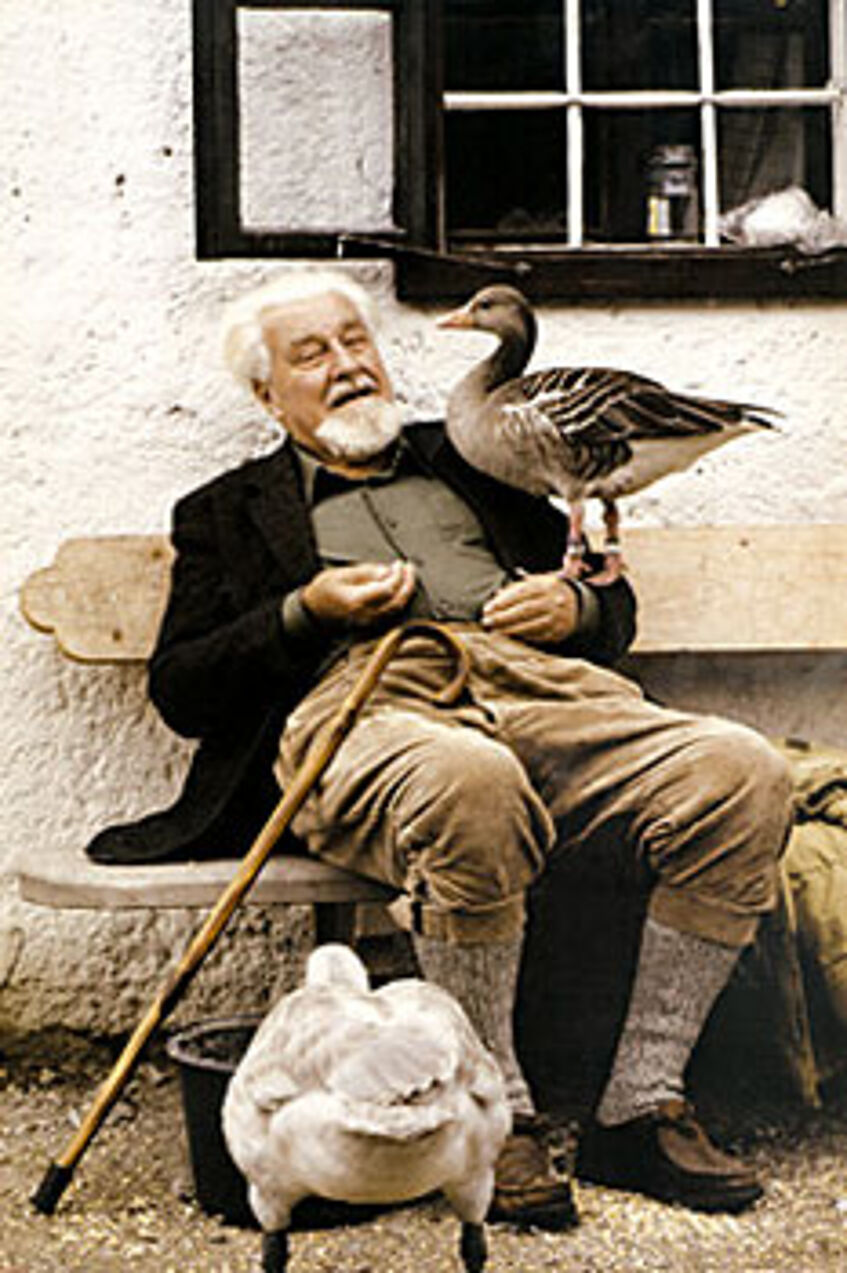Konrad Zacharias Lorenz

* 7 November 1903 in Vienna, † 27 Februar 1989
Konrad Lorenz was an Austrian zoologist, ethologist and ornithologist. Together with Nikolaas Tinbergen and Karl von Frisch, he was awarded the Nobel Prize in Physiology and Medicine in 1973.
When Konrad Lorenz retired from his directorship at the German Max Planck Society's Institute for Behavioural Physiology at Seewiesen in 1973, at the age of 70, he returned to Austria and searched for a place to continue studying the behavioural ecology of his habituated greylag goose flock. Otto König introduced Konrad Lorenz to HM Ernst August (Duke of Cumberland), who invited him to Grünau. Buildings were adapted, ponds created, and soon Lorenz and coworkers started to move the geese from Seewiesen to Grünau. With support from the Cumberland Foundation, he founded the Konrad Lorenz Research Center for Behaviour and Cognition (Upper Austrian Almtal, in A-4645 Grünau, Fischerau 13; now a Core Facility of the University of Vienna, Department of Behavioural and Cognitive Biology) and established a flock of 100 greylag geese that have persisted with flock size 100 to 200 geese over the past 50 years.
Lorenz was an eminent scientist and a great communicator of science, particularly in the discipline of ethology. He laid many core foundations in the study of animal behaviour that continue to permeate and define the field. For example, he argued that animal behaviour is worthy of study in its own right, and not only as a justification to better understand humans. As a student of anatomy and taxonomy, Lorenz recognised that animal behaviour could be studied as a trait under selection, within evolutionary and phylogenetic frameworks. His work on instincts and imprinting have shaped the emergence of studies into gene x environmental interaction effects, as we continue to ponder the role of inheritance versus experience in gene expression and phenotypic development. Lorenz proposed that teaching and learning are key adaptive traits shaped by selection, and even foreshadowed cognitive biology with his emphasis on a priori mechanisms of sensory information processing. Building on the concepts of homology and analogy, Lorenz considered cultural evolution and the role of technology passed down between generations as analogous to the spandrels of San Marco, namely design constraints that can shape ‘body plans’, implementation and information transmission. Lorenz established the science of behavioural biology and made clear that animal psychology and human psychology are indeed, inseparable. He popularized behavioural biology worldwide, particularly in German-speaking countries.
If you are interested in more information on Konrad Lorenz' life and publications, please click on the following links:
Two additional Konrad Lorenz Institutes in Austria continue with empirical and theoretical research in behavioural biology:
- The "Konrad Lorenz Institute of Ethology at the Wilheminenberg", Savoyenstraße 1a, A-1160 Wien, part of the University of Veterinary Medicine Vienna
- The semi-private "Konrad Lorenz Institute for Evolution and Cognition Research", Martinstraße 12, A-3400 Klosterneuburg
Why is the Konrad Lorenz Research Center still named after Konrad Lorenz?
The Konrad Lorenz Research Center was founded by Konrad Lorenz in 1973 and has been a Core Facility of the University of Vienna since 2012. We support an appraisal of Lorenz's legacy, we do not share his contribution to National Socialism, and advocate for profound consideration of the reciprocal influences between politics and science. The Konrad Lorenz Research Center of the University of Vienna is fully supportive of activities that contextualize the life of Lorenz. We will take research outcomes from the project "Critical Honors" seriously and as an opportunity to reflect on our own (European) history, on the person Konrad Lorenz, and the history and person of Lorenz.
